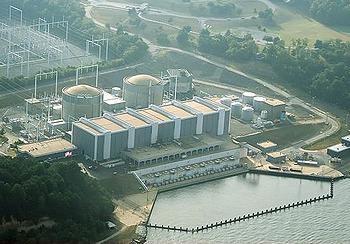
ROCKVILLE, Maryland, March 13, 2013 (ENS) – The Nuclear Regulatory Commission has upheld the denial of a construction and operating license for a third nuclear reactor at Calvert Cliffs in Maryland because the company proposing the reactor is owned by the French government.
The decision marks the first time in history that the NRC commissioners have upheld the denial of a license for a commercial nuclear reactor, and only the second time a license for a commercial nuclear facility has been denied. The first license denial was for a uranium enrichment project in Homer, Louisiana, which was denied on environmental justice grounds in 1997.

In a decision released Monday, the NRC commissioners denied UniStar Nuclear Energy’s request for a review of the Atomic Safety and Licensing Board’s denial of license issued on August 30, 2012. The board found that the project would be in violation of the Atomic Energy Act of 1954, which prohibits foreign “ownership, control or domination” of a U.S. nuclear reactor.
UniStar Nuclear is wholly owned by Electricite de France, EDF, which itself is 85 percent owned by the government of France.
Calvert Cliffs-3 was to be an European Pressurized Reactor manufactured by the French firm Areva, which is also 85 percent owned by the French government.
The 1,600-megawatt reactor was proposed for a site next to Constellation Energy’s two existing reators at Calvert Cliffs, located on the western shore of the Chesapeake Bay in southern Maryland.
In their decision the NRC commissioners explain, “Applicants are domestic subsidiaries of UniStar Nuclear Energy, LLC. At the time the application was filed, UniStar was owned in near-equal shares, through intermediate parent companies by Constellation Energy Group, Inc., an American corporation, and Electricite de France, S.A., a French company.”
“In November 2010, Applicants informed the Board that EDF has acquired Constellation’s fifty percent interest in UniStar,” the commissioners state. “Shortly thereafter, the Staff informed Applicants that it had completed its foreign ownership review, and determined that the combined license application did not satisfy the agency’s foreign ownership requirements.”

The commissioners directed NRC staff “to review issues relating to foreign ownership” and recommend whether changes to agency rules or practice are needed. They set no timetable for completion of the review, which must include stakeholder involvement.
The commissioners note that Unistar Nuclear will not go ahead with the current application “but will look instead for a U.S. partner to hold part of EDF’s 100 percent ownership share” and “submit a revised combined license application once they have located a new co-owner.”
“On this second anniversary of the Fukushima nuclear disaster, the NRC commissioners have provided the public with a rare bit of good news,” said Michael Mariotte, executive director of nonprofit Nuclear Information and Resource Service.
NIRS brought the foreign ownership issue as a contention to the Atomic Safety and Licensing Board in November 2008, along with partner intervenors national safe energy groups Public Citizen and Beyond Nuclear and the local citizens group Southern Maryland Citizen Alliance for Renewable Energy Solutions.
“Of course, the commissioners really had no choice; the Atomic Energy Act is clear: foreign ownership of U.S. nuclear reactors is illegal,” said Mariotte.
“And, in any case, this reactor was never going to be built. It could not overcome the failed economics of nuclear power generally nor the enormous cost overruns and delays being experienced by EPR projects in Finland and France. No one wants to build a reactor like that in a deregulated market like Maryland.”
Paul Gunter, director of Beyond Nuclear’s Reactor Oversight Project, said, “Electricite de France sank into the financial quicksand that is new reactor construction. U.S. nuclear corporations are clearly unwilling to join EDF in nuclear energy’s economic quagmire, a pattern that has been only too evident at EDF’s other reactor projects in Europe.”
The European Pressurized Reactors under construction in Flamanville, France and Olkiluoto, Finland, are years behind schedule and way over budget, and the design has been challenged by safety authorities in France, Finland and Britain, Gunter explains.
The Olkiluoto reactor may now not be operational until 2016, four years later than the original target date, and its price has more than doubled to US$10 billion. Flamanville’s original budget has tripled. EDF’s UK reactor plans have been marked by the departure of a series of business partners.
“Indeed, Maryland already has moved on. Last week, the Maryland legislature approved Governor O’Malley’s bill to jumpstart offshore wind power in the state,” said Mariotte. “With this decision, Maryland’s future is clear: it will be based on clean renewable power, not dirty, dangerous and expensive nuclear reactors.”
Copyright Environment News Service (ENS) 2013. All rights reserved.
